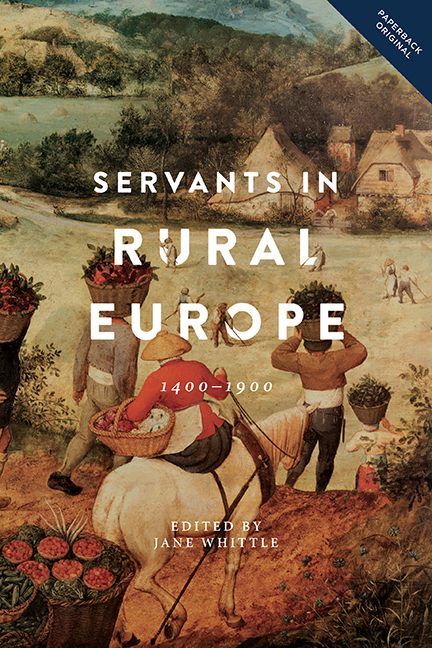Book contents
- Frontmatter
- Contents
- List of Figures
- List of Tables
- Note on Terminology
- List of Contributors
- Introduction: Servants in the Economy and Society of Rural Europe
- 1 The Employment of Servants in Fifteenth- and Sixteenth-Century Coastal Flanders: A Case Study of Scueringhe Farm near Bruges
- 2 The Institution of Service in Rural Flanders in the Sixteenth Century: A Regional Perspective
- 3 A Different Pattern of Employment: Servants in Rural England c.1500–1660
- 4 Female Service and the Village Community in South-West England 1550–1650: The Labour Laws Reconsidered
- 5 Life-Cycle Servant and Servant for Life: Work and Prospects in Rural Sweden c.1670–1730
- 6 Servants in Rural Norway c.1650–1800
- 7 Rural Servants in Eighteenth-Century Münsterland, North- Western Germany: Households, Families and Servants in the Countryside
- 8 Rural Servants in Eastern France 1700–1872: Change and Continuity Over Two Centuries
- 9 The Servant Institution During the Swedish Agrarian Revolution: The Political Economy of Subservience
- 10 Farm Service and Hiring Practices in Mid-Nineteenth-Century England: The Doncaster Region in the West Riding of Yorkshire
- 11 Dutch Live-In Farm Servants in the Long Nineteenth Century: The Decline of the Life-Cycle Service System for the Rural Lower Class
- 12 Rural Life-Cycle Service: Established Interpretations and New (Surprising) Data – The Italian Case in Comparative Perspective (Sixteenth to Twentieth Centuries)
- Select Bibliography
- Index
- People, Markets, Goods: Economies and Societies in History
1 - The Employment of Servants in Fifteenth- and Sixteenth-Century Coastal Flanders: A Case Study of Scueringhe Farm near Bruges
Published online by Cambridge University Press: 18 April 2018
- Frontmatter
- Contents
- List of Figures
- List of Tables
- Note on Terminology
- List of Contributors
- Introduction: Servants in the Economy and Society of Rural Europe
- 1 The Employment of Servants in Fifteenth- and Sixteenth-Century Coastal Flanders: A Case Study of Scueringhe Farm near Bruges
- 2 The Institution of Service in Rural Flanders in the Sixteenth Century: A Regional Perspective
- 3 A Different Pattern of Employment: Servants in Rural England c.1500–1660
- 4 Female Service and the Village Community in South-West England 1550–1650: The Labour Laws Reconsidered
- 5 Life-Cycle Servant and Servant for Life: Work and Prospects in Rural Sweden c.1670–1730
- 6 Servants in Rural Norway c.1650–1800
- 7 Rural Servants in Eighteenth-Century Münsterland, North- Western Germany: Households, Families and Servants in the Countryside
- 8 Rural Servants in Eastern France 1700–1872: Change and Continuity Over Two Centuries
- 9 The Servant Institution During the Swedish Agrarian Revolution: The Political Economy of Subservience
- 10 Farm Service and Hiring Practices in Mid-Nineteenth-Century England: The Doncaster Region in the West Riding of Yorkshire
- 11 Dutch Live-In Farm Servants in the Long Nineteenth Century: The Decline of the Life-Cycle Service System for the Rural Lower Class
- 12 Rural Life-Cycle Service: Established Interpretations and New (Surprising) Data – The Italian Case in Comparative Perspective (Sixteenth to Twentieth Centuries)
- Select Bibliography
- Index
- People, Markets, Goods: Economies and Societies in History
Summary
Coastal Flanders, the part of the county of Flanders bordering the North Sea, was among the first rural societies of north-western Europe to undergo a transition from a peasant society to a society dominated by large, commercially orientated leasehold farms between c.1300 and c.1600. By 1300, small freehold peasants, who also made a living from activities such as peat digging, salt-making or fishing, were still omnipresent in the region. Gradually these smallholders lost their properties to town dwellers and (ecclesiastical) institutional landowners. The new landowners leased their lands on competitive conditions for short terms. By the middle of the sixteenth century, large commercial tenant farmers dominated rural society. For this region, scholars have suggested that the process of enlargement of holdings created an increasing group of resident farm servants and full-time day labourers, working for most of their lives on a large farm in the neighbourhood.
However, research about the organization of rural labour in late-medieval and sixteenth-century Flanders remains scarce. Most studies have focused on the reconstruction of wages of building workers or excavation workers, employed by major institutions. Wages for labourers performing agricultural tasks such as ploughing, threshing or carting, and for harvesters are barely known. Moreover, the general significance of those wages for rural households remains unclear. Thanks to some rather anecdotal references, we know that large farmers made use of permanent, live-in employees from at least the fourteenth century onwards. The subdivision of rural labourers in a group hired per day or per task and a group hired for a longer period, during which the labourers lived at the farm, apparently dates back to at least the fourteenth century. However, only from the sixteenth century onwards, do sources permit us to learn substantially more about the latter, the servants. For early modern Flanders, the institution of service is well known, thanks to the research of Thijs Lambrecht. Evidently, the question arises whether the late-medieval live-in servants worked under the same conditions as their early modern colleagues.
- Type
- Chapter
- Information
- Servants in Rural Europe1400–1900, pp. 19 - 36Publisher: Boydell & BrewerPrint publication year: 2017

